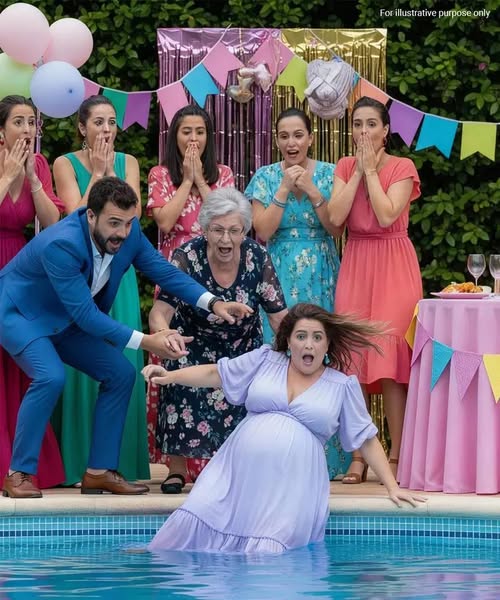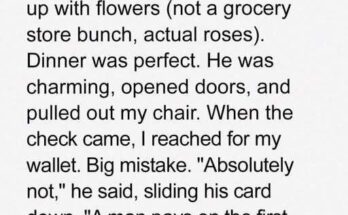I can still remember the day my world shifted in a way I never expected. It was meant to be a joyful afternoon, a small baby shower hosted by friends at our home in Valencia. I was eight months pregnant, full of anticipation, and surrounded by soft music, warm laughter, and a cake decorated with the name we had chosen for our daughter: Lucía.
Everything felt light and hopeful—until my husband, Javier, arrived with his mother. From the very beginning of our marriage, she and I had struggled to understand each other. She often made comments about how I had “taken her son away,” but I had hoped that the excitement of a grandchild might soften things between us.
During the meal, Javier stood abruptly, clearing his throat while holding up a glass. The room fell silent.
“I have something important to announce,” he said with a smile that felt strangely forced. “I’ve decided to give the ten thousand euros we set aside for the birth to my mother. She needs it more right now.”
I felt my breath catch. That savings had taken us months to pull together, and every cent was meant for the hospital.
“What are you talking about?” I whispered. “Javier, that money is for our delivery.”
Before I could say any more, his mother stepped in with a dismissive look. “My son can decide what to do,” she said sharply. “He knows what’s best.”
I tried to stay calm as I moved closer to Javier. “Please,” I said quietly. “This isn’t the moment to make a big decision like that.”
He snapped back in frustration, raising his voice. I had seen him irritated before, but not like this—not so harsh, not so sudden. His words stung, and the tension in the room thickened.
I felt overwhelmed and stepped back, but in the confusion, I stumbled near the edge of the pool. My balance was already fragile from the pregnancy, and before I knew it, I slipped. The world tilted, and I fell into the water. The shock of the cold made me gasp, and I struggled to right myself.
I remember looking up through the water, seeing blurred shapes hovering at the edge of the pool. There were raised voices, confusion, and people rushing toward me. What I didn’t see was Javier reaching out, not even a hand, not even a word. That silence cut deeper than anything else.
A wave of pressure spread across my abdomen as I tried to hold myself steady. For one terrifying moment, I wasn’t sure what was happening with the baby.
I was pulled out quickly by guests, and everything after that moved in a blur.
When I woke again, I was in a quiet hospital room, surrounded by soft beeping and the faint smell of disinfectant. A nurse sat beside me and placed a gentle hand on my shoulder.
“You’re safe,” she said. “You had a fall, but your baby is doing well. She’s strong—just like her mother.”
Tears of relief streamed down my face. Lucía was okay. That was all that mattered in that instant.
But the emotional weight of the previous day lingered heavily.
A neighbor who lived across the street had seen the commotion and called for help. Because of her, I was quickly treated, and everything stabilized safely. Later, an officer visited to ask what had happened. I explained the argument, the tension, and the chaotic moment that led to the fall. He asked whether I wanted to file any report, but all I could think about was protecting my own peace. I declined and focused instead on recovering, both physically and emotionally.
In the days that followed, Javier didn’t come to the hospital. The only message he sent read, “You misunderstood everything.” It was a short sentence, but it made everything clear. The trust between us had already faded long before the fall.
With guidance from a hospital social worker, I spoke with a counselor and reached out to my parents in Seville. They came immediately, filling the room with the warmth and steadiness I desperately needed.
Once I was discharged, I decided to stay with them for a while. The quiet hours gave me time to think about my future, my daughter, and the kind of home I wanted her to grow up in—one built on kindness, stability, and mutual respect.
Weeks later, after the situation cooled, I received a letter without a return address. I recognized Javier’s handwriting instantly.
“Maria,” it began, “I know things were handled badly. I wasn’t trying to hurt you. I felt pressure I didn’t know how to handle, and I made choices out of fear, not intention. I should have supported you that day. I froze. I know you may never understand or forgive me, but I wanted you to hear the truth.”
I read the letter several times. Part of me wondered whether it was simply regret or something deeper. But another part, the one that had begun to heal, understood that understanding and reconciliation are not always the same thing.
Eventually, I agreed to visit him, not to resume our life together, but to close a chapter.
When I entered the room where we met, I saw a man who looked older, weighed down by responsibility he had never learned to handle well.
“I’m sorry,” he said quietly.
“You should be,” I replied, my voice steady. “But I’m not here to hold on to anger. I’m here because I need clarity. And because our daughter deserves a mother who isn’t carrying bitterness in her heart.”
We spoke for a short time, both careful, both changed. When I walked out, I felt something lift from me—a release I didn’t expect. It wasn’t forgiveness. It wasn’t forgetting. It was simply the freedom of letting go.
I moved into a small apartment near the sea a few months later. Each morning, I walk along the shore with Lucía sleeping peacefully in her stroller. The sound of the waves helps me breathe deeper, and the future feels clearer than it has in years.
Life didn’t go the way I planned, but it gave me the strength I didn’t know I had. And every time I hold my daughter close, I feel something far more powerful than fear or regret. I feel hope.



